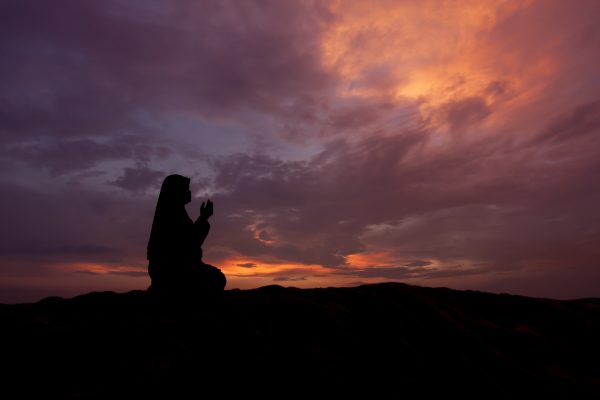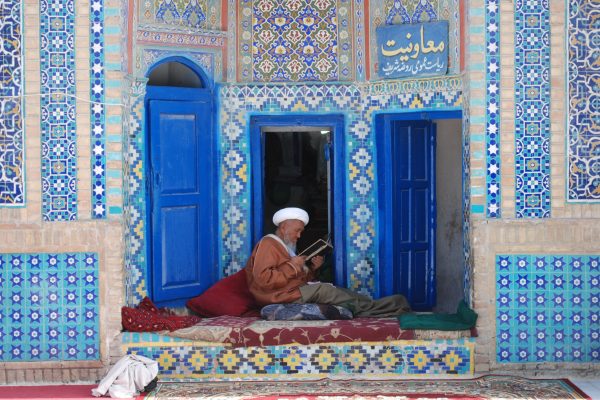From the moment of my birth, Muhammad (peace be upon him and his family) is a name that emblazoned itself upon my heart. It was the first sound of my father’s voice, whispering the call to prayer in my ear: “God is Great, Muhammad is the Messenger of God.” It was the nurturing touch of my mother as she taught my hands: “The purified are five: Muhammad, Ali, Fatima, Hassan, Hussain.” It was the cadence of my early words as I learned to say, “O God, send your blessings on Muhammad and the Family of Muhammad.”
As I grew, this name grew with me, moving beyond a word repeated to a figure beginning to be understood. Soon, his name was not just a name, but my first definition of the words love, honor, justice, mercy. His virtues were not just Sunday School lessons, but lanterns that lit the path in moments of struggle and hesitation. His was not just a story of the past, but a past life my feet began to journey toward in my dreams. Like a dear childhood friend, I found that he had buried himself within my heart, and the more I came to know him and his character, the more I cherished his presence.
Years after first hearing his name, I have undergone many experiences. In each experience, I have changed, and the meaning of this name has also changed with me. From being my friend in childhood, to my guide in adolescence, to my aspiration in adulthood, the Prophet and his message have appeared to me with new meanings and signs in the infinite manner of which only his legacy is capable.
Having recently turned 23, I find myself at a point in my life where the questions of a spent youth have become constant in my mind. “With the years I’ve been given, what have I achieved? With the good I’ve been given, what good have I given back to the world?” And in asking these questions, I find that Prophet presents himself again, in yet another way.
According to Islamic tradition, when God first made creation, the first thing he created was the Light of Muhammad, saying: “You are…the Trustee of my Light and Guidance…it is because of you that I am going to create the earth and the skies.”
Despite knowing from his birth that he was a Prophet, it was not until the age of 40 that he was commanded to reveal his Prophethood. When he did announce his message, he only spread it for a short period of time before his tragic demise at the age of 63. Leaving between the ages of 40 and 63?
23 years of revealed prophethood.
When I looked at these numbers, I found with a smile that sign I was looking for—because as I was examining the 23 years of a hopeful follower, God was bringing to my attention 23 years of a leader: a man, born and raised in Arabia, unschooled by any earthly teacher, yet able to deliver and complete in a short span of time a pristine message which would change the face of the world forever.
What was it about the Prophet and his message that he was able to transform 23 years into an infinity, while 23 years to us are like sand, slipping rapidly through the fingers? Of the endless answers to this question, perhaps one of the most important lies, not in the years spent revealing the message, but in the years spent preparing for it.
For the first 40 years of his life, the Prophet was not manifesting his prophethood, but he was doing something else, something extremely important: establishing a foundation. The foundation needed for the success of any great endeavor. Not money, worldly titles, political acclaim or social supremacy—not any of the standards which we today see as the necessary antecedents to achieving a goal. Rather, they were spent establishing the code of morality.
To a completely backwards society, trapped in the talons of tribal warfare and social injustice came this final Messenger. For four decades, it was not with his words, but with his actions that he awakened dead souls and planted seeds for their revival. The Prophet did not descend upon them declaring, “I am a Prophet of God,” but showed through his actions what it means to be a Prophet of God.
Not once, either in his private or public life, was he dishonest, selfish, or unfair; not once did he lie, cheat, speak harshly, or break a promise. Not once did he stray from the personification of ultimate moral perfection. Thus, when the time came for him to announce his Prophethood, his veracity stood unquestioned. He was the supreme model, not of “Do what I say,” but “Do what I do,” and as such, there was no friend that did not love him, and no enemy that did not, at the very least, respect him.
Through examining this portion of the Prophet’s life and its role in ensuring that the message of truth was received how it was, we may begin to see that as a society, we need to reconsider what merits we hold as the standard for respect, and who we deem to be successful individuals.
When asked by his companion Hadhrat Abu Dharr which person among the believers has completed his faith, the Prophet answered: “The best of them in manners.” And when asked, “Which believer is best?” The Prophet answered: “The one whom the people are safe from his tongue and hand.”
Through delivering a message that advocated for society’s disenfranchised members while undermining its powerful leaders, the Prophet showed that it is not the amount of wealth nor the number of degrees nor ancestral lineage that confers dignity to a person. Rather, true dignity – and true success – is solely dependent on being a person of morality. History has recorded many great personalities, but it is through the example of the Holy Prophet that we understand: greatness is not nobility; nobility is greatness.
“The greatest success of Muhammad’s life was effected by sheer moral force, without the stroke of a sword.”
In today’s troubling times, it is important that we remind ourselves and the world that it was not violence or subjugation that spread the Word of God like wildfire in a little over two decades. Rather, it was a flawless and supreme morality. There are many today who would have the world believe that depraved individuals who commit violence and horrendous acts of terror in the name of Islam represent Islam and its teachings. And if there are any who are pulled into these false concoctions, then unfortunately, we carry some of the blame. Because we have not properly understood and introduced to the world who Muhammad (s) is, what his sublime moral character is, we have created a vacuum for others to come in and define him for us.
No matter what, we must not allow the religion of Islam to be defined by nor accept anyone as its representative other than its ultimate role model. The person who, even when pelted with stones, even when blasphemed and jeered at—never reacted with violence; only with mercy. Thus, as his followers, when he is attacked in our presence, we must not react with the violence which was never a component of his character—but with the intellectual compassion and moral perseverance which is the epitome of his legacy.
God, addressing Prophet Muhammad (s): “It is due to the mercy of God that you deal with them gently; and had you been rough, hard-hearted, they would certainly have dispersed from around you.” (3:159)
It was the gentle and principled character of the Prophet that pulled people towards Islam like a magnet. By witnessing the perfection of the messenger, they became curious about the message, wanting to know what it was in its teachings that was able to lift man so high above his earthly composition, transmuting this dust into the brightest gold.
We, and I include myself first and foremost in this endeavor, must make it our goal to instill this same gentleness into our personalities.
“Oh Allah, let not those close to me fear me.”
Imam Zayn-ul-Abideen (s), grandson of the Prophet
As-Sahifa As-Sajjadiyah
Let not those close to me fear me.
Through the practical implementation of the Prophet’s morality, we must work to make this prayer a reality, thus paving the way for the world to become the kinder, safer place God intended it to be. Following in his footsteps, we must make sure that our homes are atmospheres of warmth and nourishment, not fear and suppression; that our words are kind, not harsh; that we are quick to reconciliation, not slow to forgiveness; that we honor our women, not degrade them; that we foster communities equalized by God-consciousness, not socially divided by wealth; that we encourage lives of simplicity, not perpetuate pressures to demonstrate opulence; that we have open arms in the way of compassion, not turned faces in the way of self-righteousness.
And it is only when we embrace the moral conviction of this great Messenger of God that we may begin to understand the conversation between God and the angels as mentioned in the Holy Qur’an:
“Behold, your Lord said to the angels, “I will create a vicegerent on Earth.” They said, “Will You place in it one who will make mischief and shed blood, while we celebrate Your praise and glorify Your holy name?” He said, “Surely, I know what you do not know.” (2:30)
In the depths of darkness, confusion, and violence, we may remember the dissent of the angels and begin to feel the weight of despair, heavy on our shoulders. But then, we will remember the moral legacy of the Prophet, and when we embrace it, this weight will become lifted. We will remember God’s reply to the angels, “Surely, I know what you do not know,” and realize that perhaps this—this is what God knew.
God did not need the angels to tell him that a person without morality would wish to enact an endless night on the earth; but the angels needed God to show them that a person of morality—a person sublimely rooted in goodness and truth, a person of indomitable will and unbreakable character—would not commit bloodshed, but would prevent it; would not sink below the level of animals, but rise beyond even the heights of the angels.
And it is this paragon of morality who God knew would be able to climb to the greatest heights and deliver with such nobility—Light upon light! (24:35), dispelling even the darkest night with the warmth of the sun.





